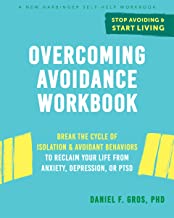Avoidant Personality Disorder
Avoidant personality disorder (AVPD) is an enduring pattern of behavior related to social inhibition, feelings of inadequacy, and sensitivity to rejection that causes problems in work situations and relationships.
Cluster Number:
Wiki Number: W019
Diagnosis: Avoidant Personality Disorder
US Patients: US-2.4%
World Patients:
Sex Ratio: M; F Equal
Age Onset:
Brain Area:
Symptoms: terrible fear of rejections, avoid social interaction
Progression: Unable to experience or express positive emotion to others or resist coercion from others.
Causes: Genetic shyness, inhibitions, childhood emotional neglect; fears intimacy and rejection
Medications:
Therapies: social skills training; cognitive, exposure and group therapies
Youtube Video: I Have Avoidant Personality Disorder
Amazon or Library Book: Overcoming Avoidance Workbook
Click the book to link or order from Amazon.

